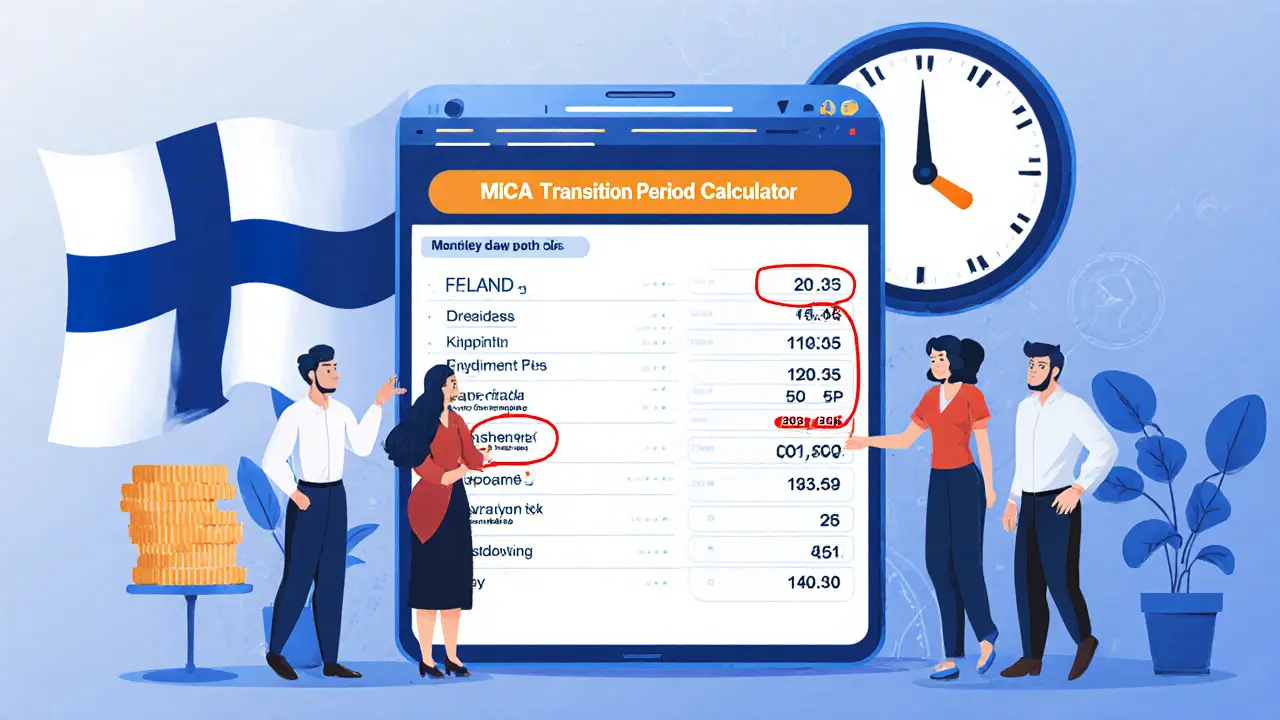MiCA Transition Period Calculator
Select your countries and click "Calculate" to see your transition deadline.
- Tip Cross-border providers must follow the shortest deadline among all jurisdictions served.
- Tip Early CASP licensing provides passporting rights across all EU states.
- Tip Grandfathered firms cannot offer services in non-compliant jurisdictions.
- Tip Finland's deadline (June 30, 2025) is the most aggressive in the EU.
Crypto firms eyeing the European market are scrambling to decode the maze of transition windows that the MiCA transition periods impose. With the Markets in Crypto-Assets Regulation (MiCA) fully in force on December 30, 2024, every existing virtual‑currency provider must either secure a full CASP licence or wrap up under a grandfathering scheme before its national deadline runs out. Miss the cut‑off and you could be barred from serving EU users altogether - a risk no savvy entrepreneur wants to take.
Quick Summary
- MiCA applies EU‑wide from 30December2024, but each Member State set its own transition deadline.
- Deadlines range from 30June2025 (Finland) to 1July2026 (Czech Republic, Belgium, Poland).
- Cross‑border providers must obey the shortest deadline among the jurisdictions they serve.
- Grandfathered firms can keep operating temporarily but lack passporting rights.
- Early CASP licensing unlocks EU‑wide passporting and avoids service interruptions.
What Is MiCA?
MiCA, the Markets in Crypto‑Assets Regulation is the EU’s comprehensive legal framework that governs crypto‑asset issuers and service providers across all 27 member states and EEA countries. Enacted to replace a patchwork of national rules, MiCA introduces uniform standards for utility tokens, asset‑referenced tokens (ARTs), e‑money tokens (EMTs) and the entities that trade, custody, or advise on them.
Why Do Transition Periods Matter?
MiCA grants existing crypto‑asset service providers a grace period - often called a “grandfathering” provision - to continue operating while they prepare a full licence application. These windows are not uniform; each National Competent Authority (NCA) decides its own cut‑off date within an 18‑month maximum. The variation creates strategic pressure for firms that serve customers in multiple countries, because the shortest deadline among those markets dictates the overall compliance timetable.
EU‑Wide Transition Timeline Snapshot
| Member State | Transition End Date | Application Deadline for CASP Licence |
|---|---|---|
| Czech Republic | 1July2026 | 31July2025 |
| Belgium | 1July2026 | 31March2025 |
| Poland | 1July2026 | 30September2025 |
| Lithuania | 1January2026 | 31July2025 |
| Finland | 30June2025 | 31October2024 (national deadline) |
| Netherlands | 31December2025 | 30June2025 |
| Germany | 31December2025 | 30June2025 |
| Norway (EEA) | 30December2025 | 31May2025 |
The table shows the spectrum: Finland’s six‑month window is the most aggressive, while the Czech Republic, Belgium, and Poland enjoy the full 18‑month grace period. For firms that operate across borders, the shortest deadline binds the entire operation.
Cross‑Border Operational Challenges
The European Securities and Markets Authority (ESMA) clarified on 17December2024 that a Virtual Asset Service Provider (VASP) must align its rollout plan with the most restrictive national transition period among the markets it serves. Suppose a VASP is incorporated in the Netherlands (12‑month window) but also offers services to Finnish customers. Because Finland’s cut‑off is 30June2025, the firm must obtain a full CASP licence before that date or suspend Finnish operations.
This rule forces crypto firms to adopt a "shortest‑deadline first" strategy. It also pushes NCAs to share application status data, enabling companies to monitor where approvals are pending and where they risk a service gap.

Finland’s Tight Schedule - A Case Study
Finland illustrates how a rapid deadline pressures firms. The Finnish Financial Supervisory Authority (FIN‑FSA) required all existing virtual‑currency providers to apply for MiCA authorisation by the end of October2024 to continue under the legacy Act on Virtual Currency Providers. Only seven firms met that deadline. Those that missed it face a hard stop on 30June2025 unless the FIN‑FSA issues a negative decision earlier, which would trigger an immediate cessation of services.
Key takeaways for businesses eyeing the Finnish market:
- Start the licence application immediately; the review process can take up to six months.
- Prepare detailed documentation on governance, capital adequacy, and security controls - FIN‑FSA scrutinises each rigorously.
- Plan a contingency to switch Finnish customers to a partner with an already‑granted CASP licence if your application stalls.
Grandfathering vs. Full CASP Licensing
Grandfathered firms can keep trading, issuing or custodial services during the transition but remain "non‑MiCA" entities. This status carries two big limitations:
- No passporting rights - you cannot automatically offer services in other EU states.
- Restricted marketing - MiCA’s advertising standards do not apply, which can lead to compliance gaps.
Conversely, a full CASP licence unlocks the passporting mechanism, allowing a single authorisation to cover all 27 EU members and EEA countries. Early licensing also signals regulatory credibility to investors and partners, a competitive edge in a crowded market.
Compliance Checklist for the Transition Period
- Map your service footprint. List every EU country where you have active users.
- Identify the shortest transition deadline among those countries.
- Gather corporate governance documents: board composition, competence statements, and conflict‑of‑interest policies.
- Calculate required own‑funds - MiCA sets a minimum of €125,000 for custodial services, higher for market‑making activities.
- Develop a data‑transparency and information‑security framework that meets ESMA’s guidelines on cyber‑risk.
- Submit the CASP licence application to your home‑state NCA before the identified cut‑off.
- Plan for a backup service model (e.g., partnership with an already‑licensed CASP) in case approval is delayed.
Strategic Implications for Market Entry
MiCA’s uniform rules raise the EU’s attractiveness for crypto innovation, but the staggered transition periods create a tactical decision point. Companies can adopt one of three approaches:
- Early‑bird licensing. Target countries with the shortest windows (Finland, Norway) to gain passporting rights quickly.
- Deferred entry. Focus on markets with longer windows (Czech Republic, Belgium) to buy time for internal readiness.
- Hybrid partnership. Operate under grandfathering in restrictive jurisdictions while partnering with a fully‑licensed CASP for cross‑border services.
Choosing the right path depends on your capital, product risk profile, and growth timeline.
Next Steps & Troubleshooting
If you’re unsure where you stand, follow this quick diagnostic:
- Check the ESMA public CASP register - see if your home‑state NCA has already issued licences.
- Verify that your internal risk‑management policies meet the MiCA capital and governance thresholds.
- If an application is rejected, immediately assess whether you can re‑apply under the same deadline or must suspend operations in the affected states.
- Maintain open communication with the NCA; many authorities provide informal pre‑submission reviews to catch gaps early.
Frequently Asked Questions
What happens if my licence is approved after my country's transition deadline?
You must stop providing crypto‑asset services in that jurisdiction until the licence becomes effective. If you have customers in other EU states with later deadlines, you can continue there, but you cannot use passporting rights for the non‑compliant market.
Can I operate under the grandfathering regime and still market across the EU?
No. Grandfathered firms lack MiCA passporting, so any cross‑border advertising or service provision must comply with the local rules of each target country, which often means you cannot actively market or onboard new EU customers.
Do stablecoins (EMTs and ARTs) have separate transition timelines?
The stable‑coin provisions took effect on 30June2024, but the full MiCA licence requirement still follows the general transition dates listed above. Issuers must meet reserve‑backing and audit obligations irrespective of the deadline.
How can I confirm the exact deadline for my home country?
Check the official bulletin of your National Competent Authority or the ESMA summary table published after 17December2024. Those sources list the precise cut‑off dates and any additional filing requirements.
Is there any grace period after a negative licence decision?
A negative decision typically takes effect immediately. The firm must cease all MiCA‑regulated activities in that state, though it may still operate under any remaining national licences that are not superseded by MiCA.












People Comments
Wow, this MiCA guide is a treasure trove of insight! 🎉 The way you break down each deadline with colorful tables really lights up the maze for newcomers. I love the tip about the shortest‑deadline rule – it's like a compass pointing straight to compliance. Keep spreading this knowledge, the crypto community thrives on such vibrant explanations!
Look, Emma, it's not rocket science – if you ignore Finland's deadline you’ll get burned. Stop dancing around the facts and start cranking those licence applications now. The EU isn’t waiting for your hesitant stroll.
People keep yapping about how easy MiCA is, but the truth is it’s a headache. The deadlines are just a trap to slow down African innovators. We need to push back and show the regulators they can’t dictate our growth.
The MiCA transition framework, while ostensibly designed to harmonize crypto regulation across the European Union, imposes a series of mandatory deadlines that must be meticulously adhered to by all market participants. Each Member State retains the authority to set its own cut‑off date, resulting in a composite timeline that ranges from the notably aggressive Finnish deadline of 30 June 2025 to the more permissive July 1 2026 dates observed in the Czech Republic, Belgium, and Poland. Consequently, a virtual‑asset service provider operating in multiple jurisdictions is compelled to align its compliance strategy with the most restrictive of these dates, as stipulated by ESMA guidance issued in December 2024. This “shortest‑deadline first” principle effectively nullifies any advantage that might be derived from operating in a state with a later deadline, because failure to obtain a full CASP licence by the earliest deadline mandates an immediate cessation of services in the stricter jurisdiction. The practical implication for firms is clear: an early, comprehensive application for a CASP licence in the home state is not merely advisable but essential to preserve market continuity across the EU. Moreover, the licensing process itself demands extensive documentation, including detailed governance structures, capital adequacy proofs, and robust cybersecurity frameworks, each of which must satisfy the stringent criteria set forth by the relevant National Competent Authority. Applicants should anticipate a review period that can extend up to six months, during which the authority will evaluate the sufficiency of the submitted evidence and may request supplementary information. In parallel, firms must conduct a thorough mapping of their customer base to accurately identify the jurisdictions impacted by the shortest deadline and to prioritize resource allocation accordingly. For entities already operating under the grandfathering provision, it is critical to recognize that this status does not confer passporting rights, thereby limiting cross‑border service provision and exposing the firm to regulatory friction. Transitioning from grandfathered status to a full CASP licence not only unlocks the coveted passporting capability but also signals to investors and partners a heightened level of regulatory compliance. Companies that neglect this strategic shift risk not only regulatory sanctions but also reputational damage that can erode user trust in an increasingly competitive market. It is advisable to maintain open communication channels with the relevant NCA, as many authorities offer informal pre‑submission reviews that can identify deficiencies before the formal application is lodged. Should an application be denied, the firm must immediately assess the feasibility of re‑submission within the remaining window or, alternatively, implement a contingency plan that may involve partnering with an already licensed CASP provider. In sum, the intricacy of the MiCA transition periods demands a proactive, well‑coordinated compliance roadmap that aligns legal, operational, and technical teams toward a common deadline. By adhering to this roadmap, crypto enterprises can not only avoid service interruptions but also position themselves competitively within the emerging European digital asset ecosystem.
Honestly, all this fuss about the EU’s “uniform” rules feels like a marketing stunt. They’re just shifting the burden onto us while pretending to protect consumers. If we keep playing by their playbook, we’ll never see true innovation.
hey sumedha, i get ur vibe, but i think the guide’s actually super usefull – it tells u exactly where the deadline is and how to calc it. just make sure u double‑check the dates on the official site, lol.
Guys, looking at the table, it’s evident that the Finnish deadline is the tightest, but the real challenge is aligning internal processes with those dates. A phased rollout, starting with a compliance audit, can smooth the transition. Also, don’t forget to engage your legal counsel early.
Indeed, Vijay, the timeline evokes a paradox: the pursuit of regulatory certainty breeds uncertainty in operational planning; yet, within this tension lies the seed of innovation,; a catalyst that propels firms toward more resilient architectures; thus, the deadline is not merely a constraint but a crucible for transformation.
The presented analysis suffers from an over‑reliance on superficial tables and fails to address the underlying economic ramifications of MiCA. It neglects to critique the disproportionate impact on emerging market participants. Overall, the piece reads like a regurgitated press release rather than a substantive examination.
While I appreciate the effort put into summarizing the deadlines, I must point out that the nuances of each national competent authority's implementation are more intricate than the table suggests; for example, Finland's pre‑application requirements differ significantly from those of Germany; future updates should reflect these subtleties.
Nice try.
Behold, the grand spectacle of regulatory theater! As if the EU were staging a tragic opera, each deadline rings like a mournful aria, demanding our undivided attention. Yet, amidst this melodrama, there lies a beacon of order for the discerning crypto maestro.
Esteemed readers, let us not be beguiled by the poetic veneer; the reality remains that any delay in securing a CASP licence constitutes a flagrant violation of EU law, and the penalties, both financial and operational, will be severe; compliance must be pursued with immediacy and rigor.
you know, it's kinda wild how these deadlines force us to rethink the very nature of digital freedom; maybe the constraints spark a deeper conversation about sovereignty and the true purpose of regulation in the crypto world.